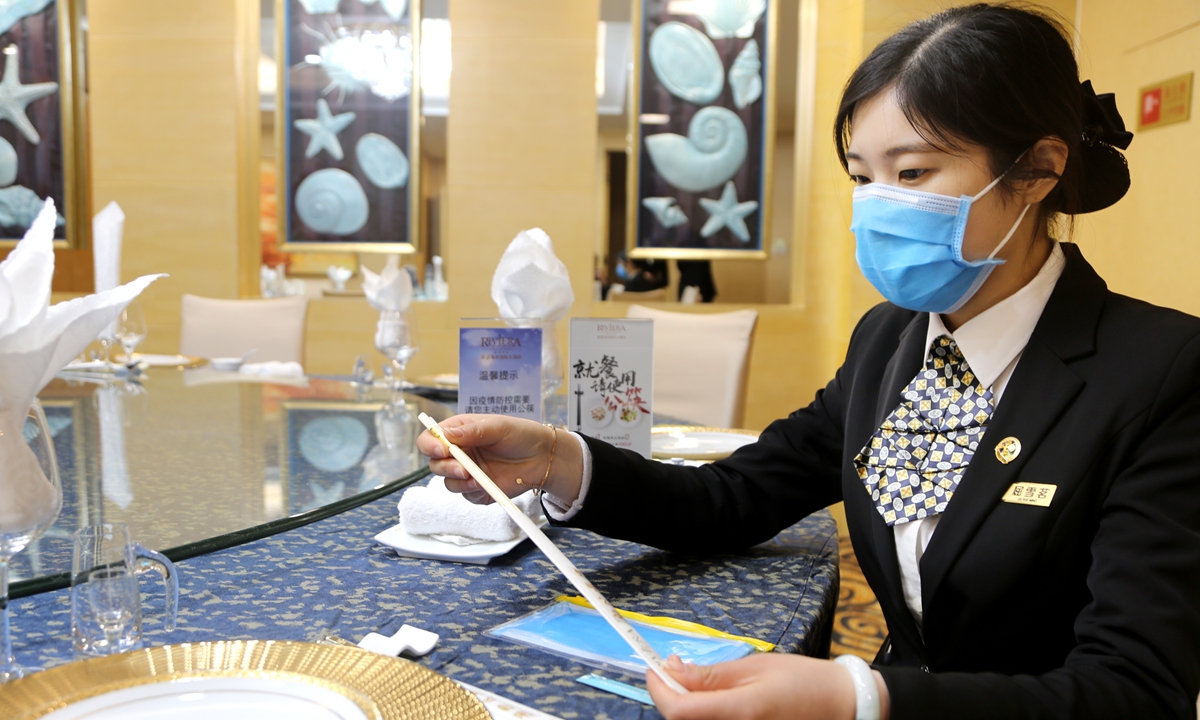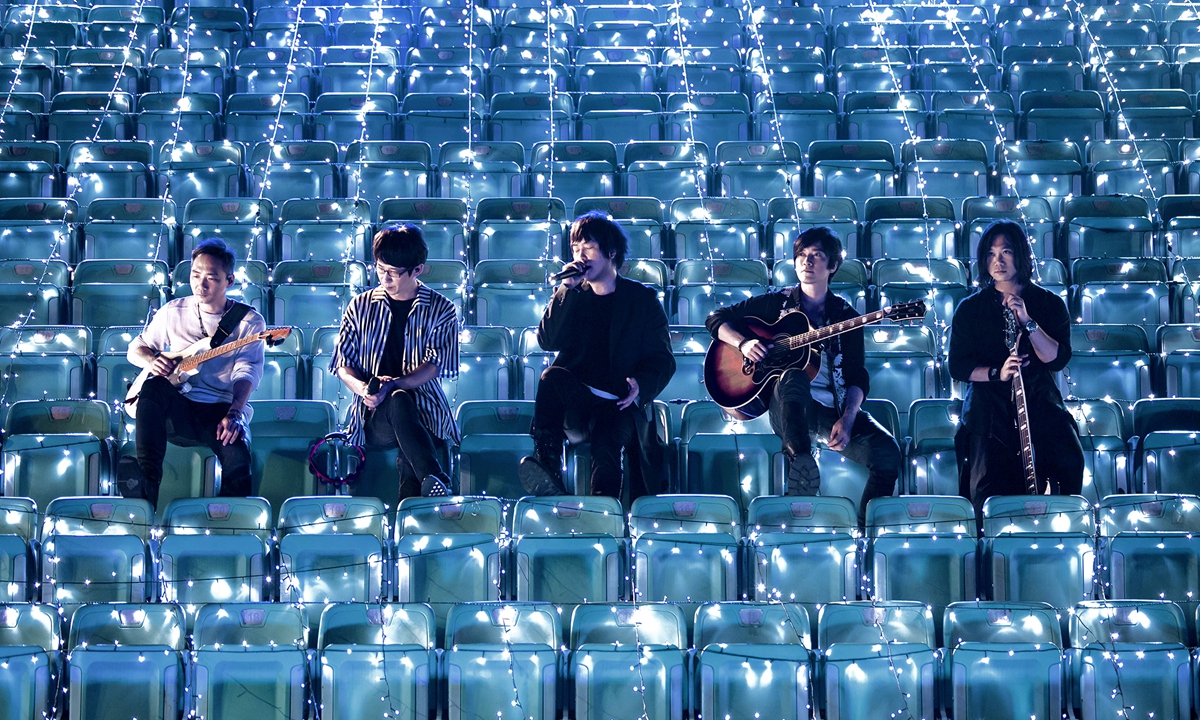When people around the world welcomed the new year of 2020, none of them imagined they would spend a whole year in the shadow of the coronavirus. The rapid spread of the virus changed the way people work, socialize, dine, exercise, seek entertainment, and even get married. To avoid being infected, people wear face masks and practice social distancing, while noisy parties and screaming concerts are deemed too dangerous and banned in many parts of the world. As this special year comes to a close, we take a look at how the epidemic has changed life.

"I let them put a pair of serving chopsticks on each table. The epidemic made me realize serving chopsticks can protect customers, as well as me."
— Qin Junyu, owner of a Chinese restaurant
Family meals at home or at restaurants have traditionally involved everyone sitting around a single table picking from several dishes that are shared together.
However, with the COVID-19 outbreak, the public was advised to use a serving spoon or serving chopsticks instead of picking food directly from serving plates with their own chopsticks.
Unlike Western countries, in China, dishes are shared communally. While it is not considered rude to ask for a gongkuai, a pair of serving chopsticks, many people still use sikuai, their personal chopsticks, to pick food from shared dishes.
As some people told the Global Times, if they eat with close friends and relatives, they would feel too embarrassed to use serving chopsticks as it seems like they dislike sharing with others, which often makes people uncomfortable.
However, the epidemic eliminated the awkwardness. "In recent times, everyone seems to have gotten used to serving chopsticks, which is considered as safer and healthier," a Wuhan resident surnamed Wan told the Global Times.
The owners of restaurants including those in rural areas don't mind the extra cost of serving chopsticks. Qin Junyu, owner of a restaurant in North China's Shanxi Province said he pushed waiters to provide serving chopsticks regardless of whether customers ask for it or not, as it is safer. "I definitely never want to see my customers being infected, so this is a necessary change."
Chinese authority also called on people to use gongkuai when eating together.
"Watching online concerts on the weekend has become a kind of popular way of entertainment."
— TME, music streaming platform
Going to a concert in a giant stadium and screaming with other fans or appreciating dramas and operas silently in a theater are all important forms of entertainment for urban people, but the virus forced people to give up these pleasures.
So, they turned to the internet, and online performances gained popularity.
A free online concert held by Mayday, a band on the island of Taiwan, was launched on the last day of May and the number of views showed the potential of online concerts.
The livestream drew in more than 35 million viewers on China's Tencent Music and swept across Chinese social media.
The concert was broadcast from the Taipei Municipal Stadium, the site of the band's first major concert after their debut. While the venue normally seats thousands, due to the epidemic, no audiences were in attendance.
But cameras and the internet relayed their performance around the world in real time.
Music companies like Tencent Music captured the trend and launched the service of livestreaming concerts.
An employee of Tencent Music Live (TME Live) surnamed Chen told the Global Times that their channel was found in March when the coronavirus had not been brought under control.
"We have held an online concert every weekend since March 10 and the channel provides a variety of ways for fans and celebrities to interact with each other," Chen said. "All the live concerts have been aired on the platform for more than 100 million times, involving hundreds of millions of music fans."
Overseas musicians also joined in the project of livestreaming music. Dua Lipa held her "Studio 2054" and Billie Eilish's "WHERE DO WE GO? THE LIVESTREAM" was presented on TME Live.
When the epidemic was gradually controlled in China, many theaters and cinemas re-opened around the country, but the online performances did not vanish.
"It is no trouble for us, because my colleagues and I still have our 'Friday chill' via video chat."
— Cheng, an architect born in Hong Kong
During the epidemic, people are relying on social apps more than ever to maintain relationships with others. Using messaging and video apps such as WeChat and Tencent Meeting has become a popular way to greet friends as well as to communicate about work with colleagues.
Restrictions such as social distancing and lockdown can be depressing but they also seem to have a positive side as they could narrow the gaps between friends.
"Staying at home made me open up more to my friends whom I have known for a long time but have not always been in touch," Ma Yue, a young artist, told the Global Times.
Working from home became popular as employers encouraged staff to use apps such as Tencent Meeting and Zoom. Though the online communication might not be as smooth as face-to-face communication, organizations have found creative ways to keep the bonding between colleagues.
"My colleagues and I always used to go out for a drink after Friday's work [before the pandemic]. However, since pubs were closed, we designed a new way to chill by drinking 'online beers,'" noted Cheng.

"We tried to find a balance between a fantasy marriage ceremony and safety amid the epidemic."
— Zhang, a bride
Twenty-eight-year-old Zhang and her husband decided to hold their marriage ceremony as soon as the ban on gatherings was lifted, as waiting is always difficult.
But considering the safety of the guests, the wedding celebration company suggested outdoor wedding, which was less common in her hometown of Taiyuan, capital of North China's Shanxi Province, rather than using a wedding hall.
Zhang told the Global Times that when she saw pretty pictures of outdoor weddings, she thought it was worth trying.
So, she stood on the green grass in a pure white wedding dress on the first day of October and was showered with blessings from relatives and friends, who were more relaxed because of lower risks of sitting outdoor.
Wang Xiaoxue, an employee of a Beijing wedding celebration company, told the Global Times that many couples chose outdoor wedding as long as the weather conditions were good.
As Zhang said, they tried to find a balance between holding a wedding ceremony and guaranteeing safety.
But there was more than one way to strike the balance. Online wedding was another method.
A Chinese couple decided to hold their wedding in an online game, even inviting more than 30 friends to attend the cloud ceremony.
"After spending two weeks preparing for the wedding game, including buying costumes for game characters, my wife and I wore our pajamas sitting in front of two computers in the study; she did not even have any makeup on during the whole ceremony," the groom "Jigen" told the Global Times.

"…doing different exercises every day during the lockdown made me feel I had spent my day differently.
— Cheng Yue, a freelance illustrator
Due to the restrictions imposed to control the epidemic, more and more people's everyday activities moved from offline to online - from doing sports indoor by referring to online resources to building and maintaining relationships through apps.
People tried various ways to exercise at home. One way was to use fitness apps such as Keep, a top Chinese mobile fitness community with more than 150 million registered users. The app has functions such as training sessions, community and shopping for users. During the epidemic, it particularly focused on encouraging users to continue their home exercise as well as maintain a good mental health through physical activities. In February 2020, more than 20 Chinese enterprises joined Keep's campaign to encourage their employees to maintain both mental and physical health while staying at home.
"I have sleeping problems and felt blue when staying at home all the time. I used Keep for a long time, doing different exercises every day during the lockdown time which made me feel like I had spent my day differently. It was very useful," Cheng Yue, a freelance illustrator, told the Global Times.
Using high-tech gaming devices for fitness is another creative way that people chose to work out at home.
"I get bored easily when doing normal work out, but we had to work from home during the lockdown, so I decided to spend a few hours a day on game-like sports," Cheng, an architect born in Hong Kong, told the Global Times while describing his experience of using an all-in-one VR headset gaming device for exercise.
Besides, the thriving livestreaming scene in China has also inspired fitness organizations to launch courses on the internet.
Bourgeoning offline fitness brands such as Super Monkey went online, and provided training courses that focused on the fitness of all household members. It livestreamed fun sessions such as "another way to use a suitcase" to inspire people to use handy objects at home as training equipment.
